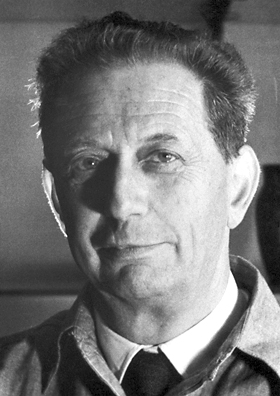André Michel Lwoff
French microbiologist and Nobel laureate
André Michel Lwoff (8 May 1902 – 30 September 1994) was a French microbiologist and virologist who was awarded the Nobel Prize in Physiology or Medicine in 1965 for his discoveries concerning the genetic regulation of viruses. His work significantly advanced the understanding of bacteriophages and the lysogenic cycle.
Early life and education[edit | edit source]
André Lwoff was born in Ainay-le-Château, France. He developed an early interest in biology and pursued his studies at the University of Paris, where he earned his medical degree and later a PhD in microbiology.
Career and research[edit | edit source]
Lwoff began his career at the Pasteur Institute in Paris, where he worked alongside prominent scientists such as Édouard Chatton and Jacques Monod. His early research focused on the protozoa and the ciliates, contributing to the understanding of their cell biology and genetics.
Discovery of lysogeny[edit | edit source]
Lwoff's most notable work was on the bacteriophages, viruses that infect bacteria. He discovered the phenomenon of lysogeny, where a bacteriophage integrates its genetic material into the host bacterium's genome and remains dormant until triggered to enter the lytic cycle. This discovery was crucial in understanding how viruses can remain latent and the mechanisms of viral gene regulation.
Nobel Prize[edit | edit source]
In 1965, Lwoff was awarded the Nobel Prize in Physiology or Medicine, along with François Jacob and Jacques Monod, for their discoveries concerning the genetic control of enzyme and virus synthesis. Their work laid the foundation for the field of molecular biology and the study of gene expression.
Legacy[edit | edit source]
Lwoff's contributions to microbiology and virology have had a lasting impact on the scientific community. His work on lysogeny and gene regulation has influenced research in genetics, immunology, and cancer biology.
Related pages[edit | edit source]
Search WikiMD
Ad.Tired of being Overweight? Try W8MD's NYC physician weight loss.
Semaglutide (Ozempic / Wegovy and Tirzepatide (Mounjaro / Zepbound) available. Call 718 946 5500.
Advertise on WikiMD
|
WikiMD's Wellness Encyclopedia |
| Let Food Be Thy Medicine Medicine Thy Food - Hippocrates |
Translate this page: - East Asian
中文,
日本,
한국어,
South Asian
हिन्दी,
தமிழ்,
తెలుగు,
Urdu,
ಕನ್ನಡ,
Southeast Asian
Indonesian,
Vietnamese,
Thai,
မြန်မာဘာသာ,
বাংলা
European
español,
Deutsch,
français,
Greek,
português do Brasil,
polski,
română,
русский,
Nederlands,
norsk,
svenska,
suomi,
Italian
Middle Eastern & African
عربى,
Turkish,
Persian,
Hebrew,
Afrikaans,
isiZulu,
Kiswahili,
Other
Bulgarian,
Hungarian,
Czech,
Swedish,
മലയാളം,
मराठी,
ਪੰਜਾਬੀ,
ગુજરાતી,
Portuguese,
Ukrainian
Medical Disclaimer: WikiMD is not a substitute for professional medical advice. The information on WikiMD is provided as an information resource only, may be incorrect, outdated or misleading, and is not to be used or relied on for any diagnostic or treatment purposes. Please consult your health care provider before making any healthcare decisions or for guidance about a specific medical condition. WikiMD expressly disclaims responsibility, and shall have no liability, for any damages, loss, injury, or liability whatsoever suffered as a result of your reliance on the information contained in this site. By visiting this site you agree to the foregoing terms and conditions, which may from time to time be changed or supplemented by WikiMD. If you do not agree to the foregoing terms and conditions, you should not enter or use this site. See full disclaimer.
Credits:Most images are courtesy of Wikimedia commons, and templates, categories Wikipedia, licensed under CC BY SA or similar.
Contributors: Prab R. Tumpati, MD

